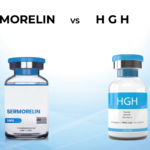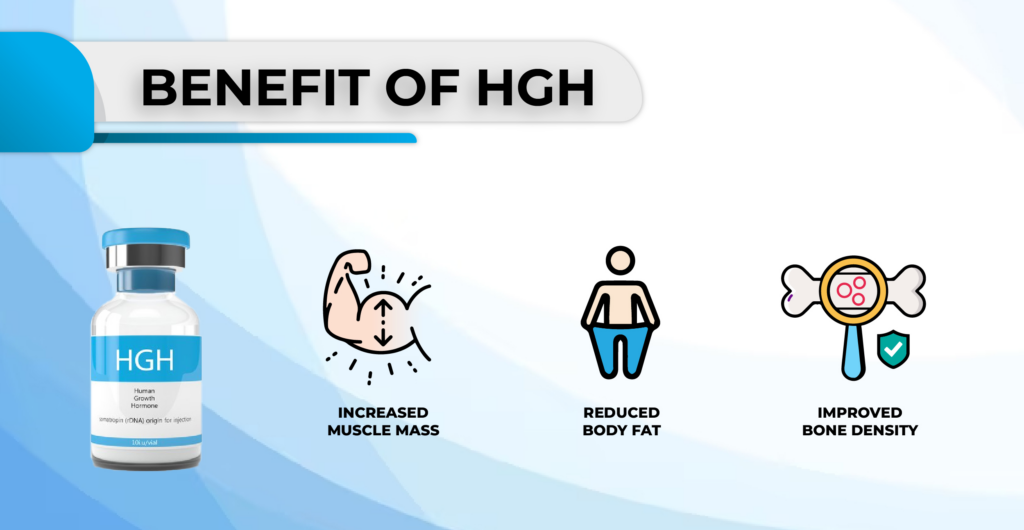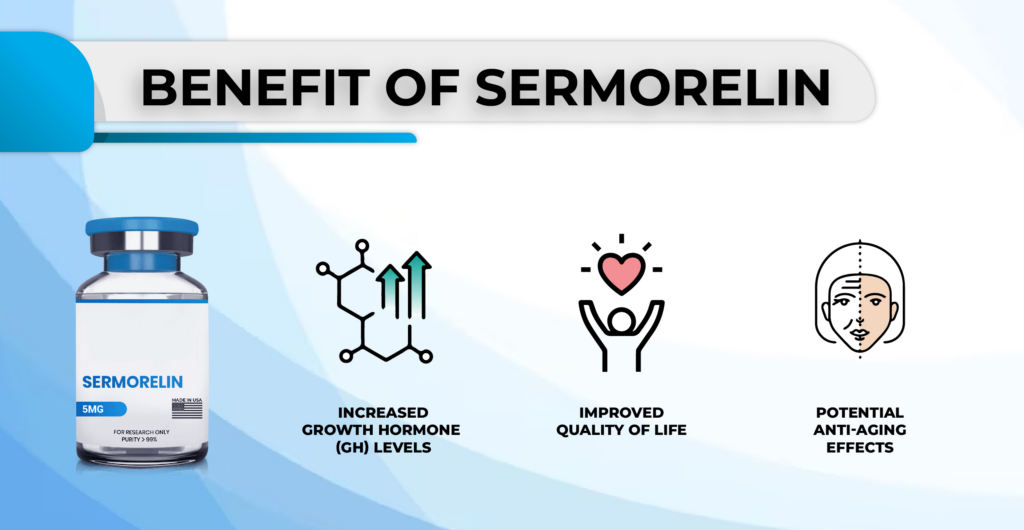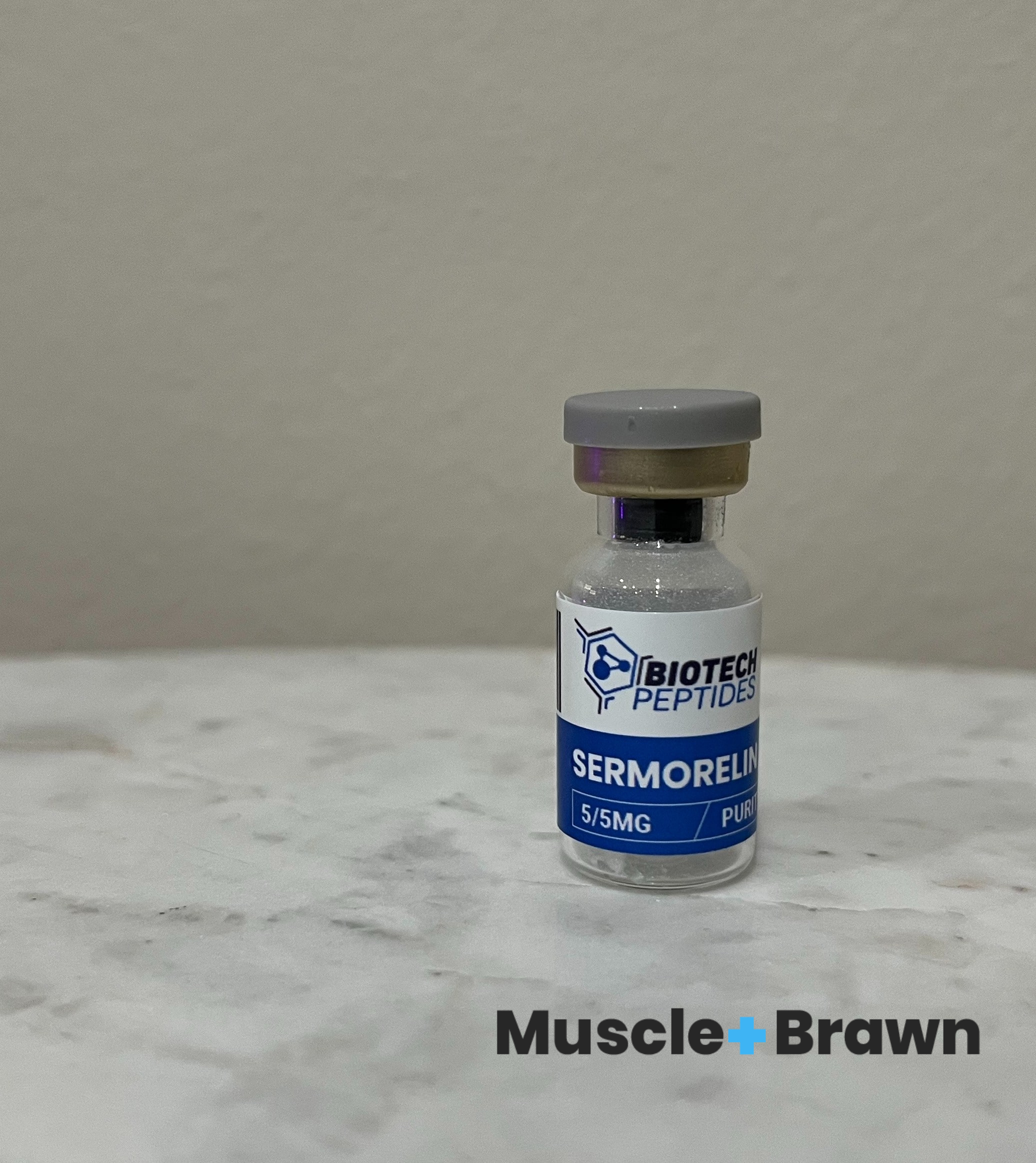
When the body’s natural HGH production is no longer prim and proper, what does one do? Well, you can either increase your natural growth hormone-releasing hormone, or, you can simply inject Human Growth Hormone HGH.
But which of these two is best??
That is what we are here to answer in this article on Sermorelin vs HGH. Both could work in treating HGH deficiency, however, one has a tremendous number of benefits over the other. But which will reign supreme?
Key Takeaways
- While both HGH and Sermorelin therapy are legal according to the FDA, you’re extremely unlikely to ever get prescribed the former
- Synthetic HGH will technically boost human growth hormone levels more, however, it will also shut down your natural production of HGH
- Sermorelin has far fewer side effects and is also the one you can actually get your hands on
What is HGH Therapy?
Let’s kick things off with what HGH therapy actually is. Human Growth Hormone (HGH) therapy, also known as Growth Hormone Replacement Therapy (GHRT), is a medical treatment involving the administration of synthetic human growth hormone to individuals with deficient levels of naturally produced growth hormone.
HGH therapy is typically administered via subcutaneous injections. These injections are given either daily or several times per week, depending on the individual’s specific needs and the treatment protocol prescribed by a healthcare provider.
Patients undergoing HGH therapy are regularly monitored by healthcare professionals to assess the effectiveness of treatment and adjust dosage levels as needed.
How does Human Growth Hormone Therapy work?
Firstly, you need to actually have a deficit in certain growth hormones. Then, once these levels have been tested and established, you can start HGH Treatments. But why would HGH levels be low in the first place?
- Natural Decline: As individuals age, the production of growth hormone by the pituitary gland decreases gradually. This natural decline typically begins in early adulthood and continues throughout life. By middle age, many individuals experience significantly reduced levels of growth hormone, which can lead to various health issues.
- Medical Conditions: Certain medical conditions or treatments can also result in decreased production of growth hormone. These conditions may include pituitary tumors, brain injury or trauma affecting the pituitary gland, radiation therapy, or surgery involving the pituitary gland.
- Genetic Factors: Some individuals may have genetic predispositions that affect the production or release of growth hormone, leading to deficiencies.
After HGH levels have been established as ‘low’, your doctor might prescribe pure HGH therapy as a means to get your human growth hormone levels back to normal. Pure HGH is injected into subcutaneous areas of the body.
Again, even since the introduction of HGH into the medical world, it was rarely used in adults. In the time we live in now, you’re almost never going to see it in the medical world being used on HGH-deficient adults. There are other less impactful means to help.
Benefits of HGH

As an adult, there are three main benefits to having your natural HGH levels restored to normal:
- Increased Muscle Mass and Strength: HGH therapy can lead to improvements in muscle mass and strength, making it beneficial for individuals looking to enhance their physical performance or recover from muscle-wasting conditions.
- Reduced Body Fat: HGH therapy has been shown to decrease body fat, particularly visceral fat, which is associated with an increased risk of various health problems, including cardiovascular disease and diabetes.
- Improved Bone Density: HGH therapy can increase bone density, reducing the risk of fractures and osteoporosis, particularly in individuals with growth hormone deficiency or other conditions affecting bone health.
Drawbacks of HGH
There are a couple of side effects to these magic Growth Hormone injections, some of which you need to pay close attention to:
- Fluid Retention: Exogenous HGH can lead to fluid retention, causing swelling or edema in various parts of the body, particularly in the hands and feet.
- Joint Pain: Some individuals may experience joint pain or stiffness as a side effect of exogenous HGH therapy. This discomfort can affect mobility and daily activities.
- Increased Risk of Certain Medical Conditions: Exogenous HGH therapy may increase the risk of developing certain medical conditions, including insulin resistance, diabetes, cardiovascular disease, and carpal tunnel syndrome. These risks are particularly relevant when HGH therapy is administered at high doses or for extended periods without proper medical supervision and monitoring.
What is Sermorelin Therapy?
Sermorelin is a synthetic peptide analog of growth hormone-releasing hormone (GHRH). It is used therapeutically to stimulate the production and release of growth hormone from the pituitary gland in the brain. Sermorelin is primarily prescribed for the treatment of growth hormone deficiency (GHD) in both children and adults.
Sermorelin works by mimicking the action of natural GHRH, which stimulates the pituitary gland to produce and release growth hormone into the bloodstream. This mechanism helps to restore normal growth hormone levels in individuals with GHD.
Sermorelin
Sermorelin, an acetate salt, is a synthetic peptide containing 29 Amino acids. This artificial peptide (GRF 1-29 NH2) mimics the action of naturally occurring growth hormone-releasing hormone (GHRH) composed of 44 Amino acid residues.
The growth hormone-releasing hormone receptors (GHRHr) are located in the anterior pituitary gland. Sermorelin binds with these receptors to trigger the increased production and secretion of growth hormone (GH) by somatotroph cells.
As feedback mechanisms maintain the hormonal levels, the increased serum concentration of growth hormone (GH) stimulates another endogenous hormone called somatostatin, also known as growth hormone inhibiting hormone (GHIH).
Growth hormone inhibiting hormone (GHIH) initiates a negative feedback mechanism to stop the secretion of any more growth hormone (GH) by the somatotroph cells so that hormonal levels don’t overshoot.
Thus, sermorelin makes sure to keep the entire homeostatic coordination of the hypothalamus-pituitary-somatostatin intact.
Apart from this, sermorelin also improves the sleep-related circadian rhythm by reducing the production of stress hormones. This further amplifies the release of growth hormone (GH).
Sermorelin Overview
 Top Benefits: Increases natural HGH production
Top Benefits: Increases natural HGH production Form: Injectable liquid
Form: Injectable liquid Max Time Used: Up to 3 months
Max Time Used: Up to 3 months Average Cost: $42.99
Average Cost: $42.99 Side Effects: Insulin resistance
Side Effects: Insulin resistance Dangers: Not really
Dangers: Not really  Best Peptide Stack: HGH / IGF-1 / GHRP / CJC-1295
Best Peptide Stack: HGH / IGF-1 / GHRP / CJC-1295
⚤ Men/Women: Men and women Go to the Full review
Go to the Full review
- Enhanced muscle growth
- Efficient healing of wounds
- Reduces body fat
- Better sleep quality
- Improves brain functioning
- Cardiovascular growth
- Injection site pain
- Insulin resistance
- might experience headaches, nausea, dizziness, flushing, allergic reactions, loss of taste, hyperactivity, and paleness of skin
How does Sermorelin Therapy work?
As a synthetic analog of growth hormone-releasing hormone (GHRH), Sermorelin shares structural similarities with natural GHRH and binds to GHRHRs on the surface of pituitary cells.
Upon binding to these receptors, Sermorelin triggers a cascade of intracellular signaling events within the pituitary gland. This signaling pathway ultimately leads to the activation of adenylate cyclase and the subsequent increase in cyclic adenosine monophosphate (cAMP) levels within pituitary cells.
Elevated cAMP levels play a crucial role in stimulating the synthesis and secretion of growth hormone from the pituitary gland’s somatotropic cells. This process involves the mobilization of stored growth hormone vesicles and the release of newly synthesized growth hormone into the bloodstream.
By promoting the secretion of growth hormone, Sermorelin helps restore normal growth hormone levels in individuals with growth hormone deficiency (GHD). The increased availability of growth hormone in the bloodstream subsequently exerts its effects on target tissues throughout the body, leading to various physiological responses, including growth, metabolism, and tissue repair.
Benefits of Sermorelin

- Increased Growth Hormone Levels: Sermorelin therapy stimulates the production and release of growth hormone from the pituitary gland, leading to increased circulating levels of growth hormone. This can result in various benefits such as improved muscle mass, reduced body fat, enhanced bone density, and increased energy levels.
- Improved Quality of Life: Sermorelin therapy has been associated with improvements in overall well-being, mood, and cognitive function. Patients often report feeling more energetic, mentally sharp, and better able to handle stress, which can contribute to an enhanced quality of life.
- Potential Anti-Aging Effects: Some studies suggest that Sermorelin therapy may have anti-aging effects, including improved skin elasticity, reduced wrinkles, and enhanced wound healing. These potential benefits are thought to be mediated, at least in part, by the effects of growth hormone on tissue repair and regeneration.
Drawbacks of Sermorelin
- Cost and Accessibility: Sermorelin therapy can be expensive, especially when considering the need for ongoing treatment and monitoring. Additionally, accessibility to Sermorelin therapy may vary depending on factors such as healthcare provider recommendations, insurance coverage, and regulatory considerations.
- Side Effects: While generally well-tolerated, Sermorelin therapy may cause side effects in some individuals. Common side effects include pain, redness, or swelling at the injection site, as well as headaches, flushing, dizziness, or nausea. Serious side effects are rare but may include allergic reactions or complications related to changes in blood sugar levels.
- Long-Term Safety Concerns: There are ongoing debates and research regarding the long-term safety of Sermorelin therapy, particularly concerning its potential impact on cancer risk, cardiovascular health, and insulin sensitivity. While short-term studies have shown promising results, more extensive and long-term research is needed to fully understand the safety profile of Sermorelin therapy over extended periods.
Where can I get HGH and Sermorelin Treatment?
As mentioned, you are more likely to get Sermorelin Acetate than HGH injections. This is because the latter is often sold on the black market to fitness folk to improve their overall health (bone growth, muscle growth, fat loss, etc). It is also abused by adults looking to slow the aging process. You can, however, perhaps get Growth Hormone Releasing Treatment from an online HRT clinic. You might not be taking Sermorelin, but something is even better based on the current research.
Sermorelin vs HGH Bodybuilding
Not a single bodybuilder alive uses Sermorelin. You’re comparing a Corolla vs a Ferrari. Bodybuilders have no concern for being ‘adult’ or ‘light’. Thus, they will always opt for the better (and more aggressive) option – which is HGH in this case. Even though it is extremely illegal, it is still the one they will opt for.
Conclusion
In the realm of growth hormone deficiency treatment, the choice between Sermorelin and Human Growth Hormone (HGH) therapy often arises, each presenting distinct advantages and drawbacks. While both aim to address low growth hormone levels, they diverge significantly in their mechanisms, accessibility, and potential effects on the body.
HGH therapy, involving the direct injection of synthetic human growth hormone, boasts potent effects on muscle mass, fat reduction, and bone density. However, it comes with a price – not just financially, but in terms of potential side effects and the suppression of natural growth hormone production. Access to HGH therapy can be limited, and its use in adults is becoming increasingly rare due to regulatory restrictions and safety concerns.
On the other hand, Sermorelin therapy offers a more nuanced approach by stimulating the body’s natural production of growth hormone through the activation of growth hormone-releasing hormone receptors. It presents fewer side effects, better safety profiles, and easier accessibility compared to HGH therapy. Although its effects may be less potent than synthetic HGH, Sermorelin still holds promise in improving muscle mass, fat metabolism, and overall quality of life.
Is Sermorelin safer than HGH?
Potentially. HGH is more likely to have a negative impact on your blood glucose levels as well as downregulate your endogenous HGH production.
Do bodybuilders use Sermorelin?
Not at all. Not a single one, they all use HGH.

